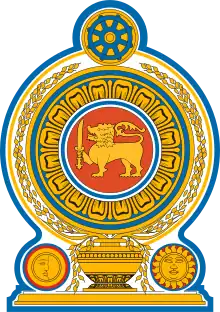Tikiri Banda Subasinghe
Subasinghe Mudiyanselage Tikiri Banda Subasinghe (14 August 1913 – 10 August 1995) was a Sri Lankan statesman. He was the 7th Speaker of the Parliament of Sri Lanka and Sri Lankan Ambassador to the Soviet Union[1][2] He also served as Parliamentary Secretary to the Minister of Defence and External Affairs and Minister of Industries and Scientific Affairs.[3]
Tikiri Banda Subasinghe | |
|---|---|
 | |
| Minister of Industries and Scientific Affairs | |
| In office May 1970 – 1 March 1977 | |
| Prime Minister | Sirimavo Bandaranaike |
| Preceded by | Philip Gunawardena |
| Succeeded by | Cyril Mathew |
| 2nd Sri Lankan Ambassador to the Soviet Union | |
| In office 1961–1965 | |
| Prime Minister | Sirimavo Bandaranaike |
| Preceded by | Gunapala Piyasena Malalasekera |
| Succeeded by | B. F. Perera |
| 7th Speaker of the Parliament | |
| In office 30 March 1960 – 23 April 1960 | |
| Prime Minister | Dudley Senanayake |
| Preceded by | Hameed Hussain Sheikh Ismail |
| Succeeded by | R. S. Pelpola |
| Parliamentary Secretary to the Minister of Defence and External Affairs | |
| In office 1956–1959 | |
| Prime Minister | S. W. R. D. Bandaranaike |
| Preceded by | V Nalliah |
| Succeeded by | Felix R D Bandaranaike |
| Member of the Ceylonese Parliament for Bingiriya | |
| In office 1947 – July 1960 | |
| Succeeded by | Leelananda Weerasinghe |
| Member of the Ceylonese Parliament for Katugampola | |
| In office 1965–1977 | |
| Preceded by | Leelananda Weerasinghe |
| Succeeded by | Gamini Jayawickrama Perera |
| Personal details | |
| Born | 14 August 1913 British Ceylon |
| Died | 10 August 1995 |
| Political party | Sri Lanka Freedom Party (1965–1977) |
| Other political affiliations | Lanka Sama Samaja Party (–1955) Independent Socialist Party (1955-1959) United National Party (1959) Independent (1960-1965) |
| Spouse | Lolita |
| Children | Swineetha, Sarojini |
| Residence(s) | Kirula Road, Narahenpita |
| Alma mater | Ananda College |
Life
While studying at the London School of Economics, Subasinghe attended the 5th Pan-African Congress, held in Manchester in October 1945,[4] and helped to organize the All-Colonial Peoples' Conferences held in London around the same time.[5] A founding member of the Lanka Sama Samaja Party (LSSP), Subasinghe entered parliament contesting the Bingiriya seat at the 1947 Parliamentary general elections.
With the 1956 general elections, he was appointed as Parliamentary Secretary to the Minister of External Affairs and Defence in the S. W. R. D. Bandaranaike cabinet.[1][3] In 1960, he was unanimously elected Speaker of Parliament following the general elections in the short lived UNP led coalition government defeating veteran Speaker Sir. Albert F. Peiris both of whom represented from North Western Province.
Subasinghe was a prominent figure in the Suriya-Mal Movement which became the springboard for the Marxist and anti-imperialist movements in the country. He had two brothers (Vincent and Tudor Subasinghe) and two sisters.[1]
References
- "T.B. Subasinghe commemoration". Dailynews.lk. 28 August 2009. Retrieved 30 December 2013.
- Rupasinghe, Winston. "Revisiting our Russian friends". Sundayobserver.lk. Archived from the original on 30 December 2013. Retrieved 30 December 2013.
- "SUBASINGHE, Tikiri Banda (1913-1995), research papers on". AIM25. Archived from the original on 30 December 2013. Retrieved 30 December 2013.
- Christian Høgsbjerg, Remembering the Fifth Pan-African Congress, African Studies Bulletin, No 77 (Winter 2015/16), pp. 119–139.
- Marika Sherwood, The All Colonial Peoples Conferences in Britain, 1945, African Studies Bulletin, No. 79 (Winter 2017/18), pp. 113–24.
